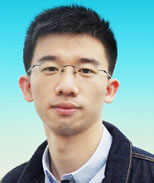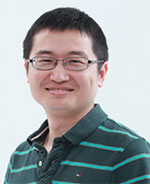Upcoming Webinar: "An Algorithmic Investigation of Hybrid Beamforming for 5G and Beyond Networks"

Upcoming Webinar - 21 August 2020
Webinar Topic: "An Algorithmic Investigation of Hybrid Beamforming for 5G and Beyond Networks"
Presenters: Xianghao Yu and Jun Zhang
Based on the IEEE Xplore® article
Alternating Minimization Algorithms for Hybrid Precoding in Millimeter Wave MIMO Systems
published in the the IEEE Journal of Selected Topics in Signal Processing, February 2016
| Presenters: Date: Time: Duration: Register: Download: |
Xianghao Yu and Jun Zhang 21 August 2020 08:00 AM EDT (New York time) Approximately 1 hour Attendee Registration Original article will be made freely available for download on the day of the webinar, on IEEE Xplore® |

The IEEE Signal Processing Society would like to express our concern and support for the members of our global community and all affected by the current COVID-19 pandemic. We appreciate your continued patience and support as we work together to navigate these unforeseen and uncertain circumstances. We hope that you, your families, and your communities are safe!
About this topic:
Large-scale antenna arrays, also known as massive MIMO, are key enablers for 5G and beyond networks, which, however, bring tremendous pressures on hardware cost and energy consumption. Hybrid beamforming architectures have been recently proposed as a promising solution for the cost-effective implementation of massive MIMO, but they also bring formidable challenges to beamforming algorithm design, which differs fundamentally from that of the fully digital one.
This webinar presents recent developments in this active area, introducing algorithms for different hardware architectures. A holistic approach will be taken, emphasizing on the three decisive aspects: 1) hardware efficiency (HE), i.e., the required hardware components; 2) computational efficiency (CE) of the associated beamforming algorithm; and 3) achievable spectral efficiency (SE). Through systematic investigation of design algorithms, the interplay and tradeoff among the three design aspects will be revealed, and promising candidates for hybrid beamforming in 5G and beyond systems will be identified.
About the presenters:

Xianghao Yu received the B.Eng. degree in information engineering from Southeast University, Nanjing, China, in 2014, and his Ph.D. degree in electronic and computer engineering from the Hong Kong University of Science and Technology (HKUST), Hong Kong, China, in 2018.
He is currently a Humboldt Post-Doctoral Research Fellow at the Institute for Digital Communications, Friedrich-Alexander-University Erlangen-Nuremberg (FAU), Erlangen, Germany. His research interests include millimeter wave communications, intelligent reflecting surface-assisted communications, MIMO systems, mathematical optimization, and stochastic geometry.
Dr. Yu co-authored the book Stochastic Geometry Analysis of Multi-Antenna Wireless Networks (Springer, 2019). He received the IEEE Global Communications Conference (GLOBECOM) 2017 Best Paper Award, the 2018 IEEE Signal Processing Society Young Author Best Paper Award, and the IEEE GLOBECOM 2019 Best Paper Award.

Jun Zhang received the Ph.D. degree in Electrical and Computer Engineering from the University of Texas at Austin.
He is an Assistant Professor in the Department of Electronic and Information Engineering at the Hong Kong Polytechnic University (PolyU). His research interests include wireless communications and networking, mobile edge computing and edge learning, distributed learning and optimization, and big data analytics.
Dr. Zhang co-authored the book Fundamentals of LTE (Prentice-Hall, 2010). He is a co-recipient of the 2019 IEEE Communications Society & Information Theory Society Joint Paper Award, and the 2016 Marconi Prize Paper Award in Wireless Communications (the best paper award of IEEE Transactions on Wireless Communications). In 2016 and 2018, he co-authored papers that received the Young Author Best Paper Award of the IEEE Signal Processing Society. He also received the 2016 IEEE ComSoc Asia-Pacific Best Young Researcher Award. He is an Editor of IEEE Transactions on Wireless Communications and IEEE Transactions on Communications.

